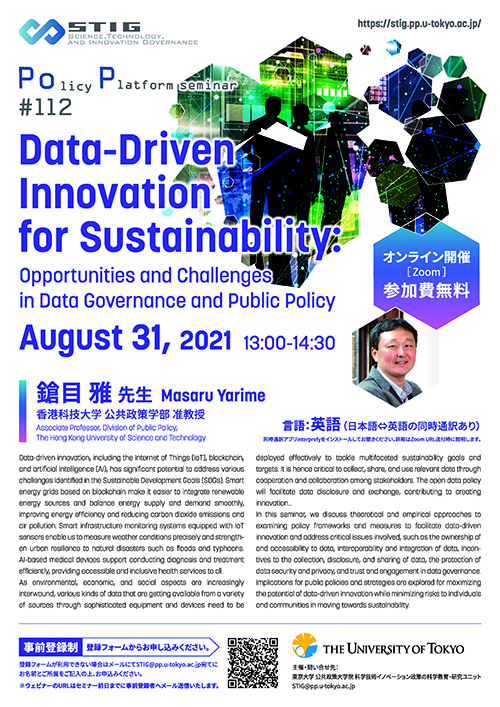112th STIG PoP Seminar: “Data-Driven Innovation for Sustainability: Opportunities and Challenges in Data Governance and Public Policy”

Details
| Type | Lecture |
|---|---|
| Intended for | General public / Enrolled students / International students / Companies / University students / Academic and Administrative Staff |
| Date(s) | August 31, 2021 13:00 — 14:30 |
| Location | Online |
| Venue | Online by Zoom (13:00-14:30 JST) |
| Entrance Fee | No charge |
| Registration Method | Advance registration required
Visit our [Registration Form]. If you cannot open the page, please email the STIG OFFICE. The Zoom URL will be sent to registrants’ email addresses prior to the event. |
| Registration Period | — August 31, 2021 |
| Contact | STIG OFFICE (Science, Technology, and Innovation Governance) Education and Research Program STIG*pp.u-tokyo.ac.jp (change * to @) |
 Data-driven innovation, including the Internet of Things (IoT), blockchain, and artificial intelligence (AI), has significant potential to address various challenges identified in the Sustainable Development Goals (SDGs). Smart energy grids based on blockchain make it easier to integrate renewable energy sources and balance energy supply and demand smoothly, improving energy efficiency and reducing carbon dioxide emissions and air pollution. Smart infrastructure monitoring systems equipped with IoT sensors enable us to measure weather conditions precisely and strengthen urban resilience to natural disasters such as floods and typhoons. AI-based medical devices support conducting diagnosis and treatment efficiently, providing accessible and inclusive health services to all.
Data-driven innovation, including the Internet of Things (IoT), blockchain, and artificial intelligence (AI), has significant potential to address various challenges identified in the Sustainable Development Goals (SDGs). Smart energy grids based on blockchain make it easier to integrate renewable energy sources and balance energy supply and demand smoothly, improving energy efficiency and reducing carbon dioxide emissions and air pollution. Smart infrastructure monitoring systems equipped with IoT sensors enable us to measure weather conditions precisely and strengthen urban resilience to natural disasters such as floods and typhoons. AI-based medical devices support conducting diagnosis and treatment efficiently, providing accessible and inclusive health services to all.As environmental, economic, and social aspects are increasingly interwound, various kinds of data that are getting available from a variety of sources through sophisticated equipment and devices need to be deployed effectively to tackle multifaceted sustainability goals and targets. It is hence critical to collect, share, and use relevant data through cooperation and collaboration among stakeholders. The open data policy will facilitate data disclosure and exchange, contributing to creating innovation.
There are many policy challenges, however, that we need to consider in properly utilizing data for innovation for sustainability. Technical issues related to data, such as metadata tagging, quality control, cleaning and error elimination, and interoperability between various standards, must be addressed to support data sharing. Stakeholders have different interests and motivations and would not necessarily be willing to disclose or exchange data with each other, which would require us to consider a proper balance between open and proprietary data. Serious concerns are also raised about dealing with sensitive data in terms of security and privacy. Micro-targeted nudging for sustainable behavior based on detailed personal data could involve manipulation or paternalism.
Various policy approaches can be considered for data governance. The government can be in charge of governing public data, whereas platform enterprises in the private sector also play a critical role in assembling and managing an increasing amount of data. A data trust can be established as an independent institution to make decisions about who has access to data under what conditions, how that data is used and shared for what purposes, and who can benefit from it. Transparency and citizens’ participation and engagement in the processes of data governance are particularly emphasized in encouraging social acceptance and inclusiveness in pursuing sustainable objectives.
Data-driven innovation poses a difficult challenge to policymaking. The speed of technological change is rapid, and the path of its evolution is not entirely predictable or explainable. That would produce a widening gap between technological change and institutional readiness. Also, various sectors, including energy, transportation, and health, which were not connected previously, are increasingly integrated through data in cyber-physical systems. Novel policy approaches, such as regulatory sandboxes, would be required to incorporate the ability to learn from real-world use and experience and improve performance through adaptation. In-depth research needs to investigate what kinds of policy frameworks and measures would be effective in collecting, sharing, and using data among stakeholders and what impacts would be made on facilitating data-driven innovation while addressing societal concerns, including data security and privacy.
In this seminar, we discuss theoretical and empirical approaches to examining policy frameworks and measures to facilitate data-driven innovation and address critical issues involved, such as the ownership of and accessibility to data, interoperability and integration of data, incentives to the collection, disclosure, and sharing of data, the protection of data security and privacy, and trust and engagement in data governance. Implications for public policies and strategies are explored for maximizing the potential of data-driven innovation while minimizing risks to individuals and communities in moving towards sustainability.
[Language] English
(with English <->Japanese simultaneous interpretation: Install the app “Interprefy” on your PC or Smart Phone | Manual will be provided when the Zoom URL will be announced).
[Speaker] YARIME Masaru, Associate Professor, Division of Public Policy, The Hong Kong University of Science and Technology; Honorary Associate Professor, Department of Science, Technology, Engineering and Public Policy, University College London; Visiting Associate Professor, Graduate School of Public Policy, The University of Tokyo
http://yarime.net/






